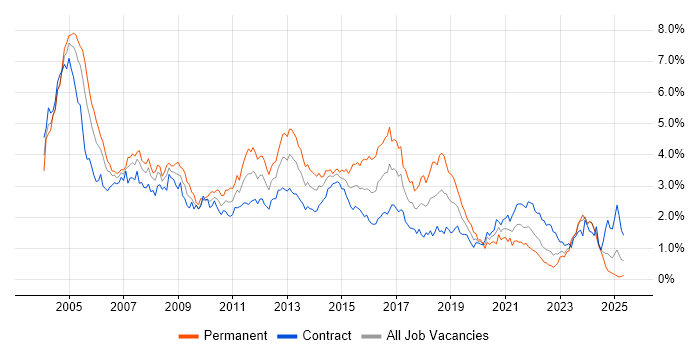PL/SQL (PLSQL)
UK > Scotland
The table below provides summary statistics and salary benchmarking for jobs advertised in Scotland requiring PL/SQL skills. It covers permanent job vacancies from the 6 months leading up to 4 March 2026, with comparisons to the same periods in the previous two years.
| 6 months to 4 Mar 2026 |
Same period 2025 | Same period 2024 | |
|---|---|---|---|
| Rank | 108 | 130 | 130 |
| Rank change year-on-year | +22 | 0 | +75 |
| Permanent jobs citing PL/SQL | 36 | 10 | 104 |
| As % of all permanent jobs in Scotland | 1.19% | 0.45% | 2.27% |
| As % of the Programming Languages category | 5.39% | 1.30% | 4.00% |
| Number of salaries quoted | 4 | 2 | 9 |
| 10th Percentile | - | £50,000 | £50,800 |
| 25th Percentile | £46,250 | £53,750 | £51,000 |
| Median annual salary (50th Percentile) | £47,500 | £62,500 | £53,000 |
| Median % change year-on-year | -24.00% | +17.92% | +29.00% |
| 75th Percentile | £48,750 | £71,250 | £61,500 |
| 90th Percentile | - | £75,000 | £63,950 |
| UK median annual salary | £64,000 | £60,000 | £55,582 |
| % change year-on-year | +6.67% | +7.95% | +1.06% |
All Programming Languages
Scotland
PL/SQL falls under the Programming Languages category. For comparison with the information above, the following table provides summary statistics for all permanent job vacancies requiring coding skills in Scotland.
| Permanent vacancies with a requirement for coding skills | 668 | 767 | 2,601 |
| As % of all permanent jobs advertised in Scotland | 22.03% | 34.80% | 56.83% |
| Number of salaries quoted | 278 | 459 | 1,030 |
| 10th Percentile | £28,250 | £33,750 | £35,000 |
| 25th Percentile | £35,000 | £42,500 | £42,500 |
| Median annual salary (50th Percentile) | £57,500 | £56,318 | £55,000 |
| Median % change year-on-year | +2.10% | +2.40% | -7.60% |
| 75th Percentile | £73,987 | £72,500 | £68,688 |
| 90th Percentile | £88,750 | £93,778 | £80,000 |
| UK median annual salary | £62,500 | £65,000 | £60,000 |
| % change year-on-year | -3.85% | +8.33% | -7.69% |
PL/SQL
Job Vacancy Trend in Scotland
Historical trend showing the proportion of permanent IT job postings citing PL/SQL relative to all permanent IT jobs advertised in Scotland.

PL/SQL
Salary Trend in Scotland
Salary distribution trend for jobs in Scotland citing PL/SQL.

PL/SQL
Job Locations in Scotland
The table below looks at the demand and provides a guide to the median salaries quoted in IT jobs citing PL/SQL within the Scotland region over the 6 months to 4 March 2026. The 'Rank Change' column provides an indication of the change in demand within each location based on the same 6 month period last year.
| Location | Rank Change on Same Period Last Year |
Matching Permanent IT Job Ads |
Median Salary Past 6 Months |
Median Salary % Change on Same Period Last Year |
Live Jobs |
|---|---|---|---|---|---|
| Edinburgh | +26 | 35 | £47,500 | - | |
| Aberdeen | - | 1 | - | - | |
| PL/SQL UK |
|||||
PL/SQL
Co-Occurring Skills & Capabilities in Scotland by Category
The following tables expand on the one above by listing co-occurrences grouped by category. They cover the same employment type, locality and period, with up to 20 co-occurrences shown in each category:
|
|
||||||||||||||||||||||||||||||||||||||||||||||||||||||||||||||||||||||||
|
|
||||||||||||||||||||||||||||||||||||||||||||||||||||||||||||||||||||||||
|
|
||||||||||||||||||||||||||||||||||||||||||||||||||||||||||||||||||||||||
|
|
||||||||||||||||||||||||||||||||||||||||||||||||||||||||||||||||||||||||
|
|
||||||||||||||||||||||||||||||||||||||||||||||||||||||||||||||||||||||||
|
|
||||||||||||||||||||||||||||||||||||||||||||||||||||||||||||||||||||||||
|
|
||||||||||||||||||||||||||||||||||||||||||||||||||||||||||||||||||||||||
|
|||||||||||||||||||||||||||||||||||||||||||||||||||||||||||||||||||||||||
